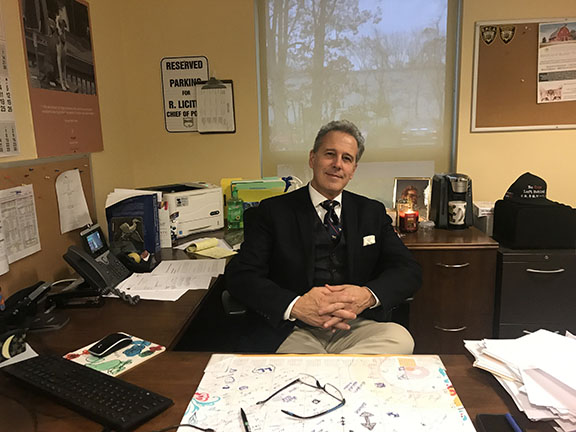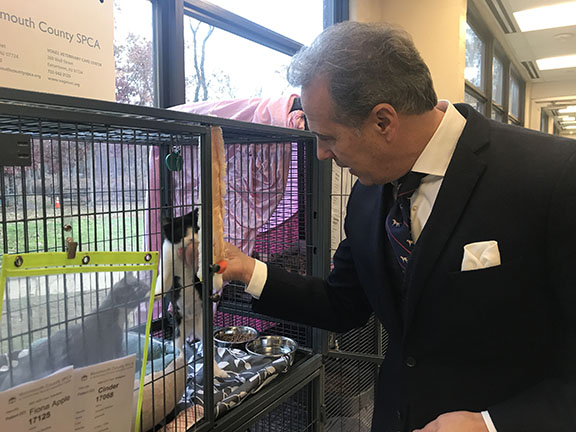
Ross Licitra, director of the Monmouth County SPCA.
Photo by Allison Perrine
EATONTOWN – This year, the Monmouth County Society for the Prevention of Cruelty to Animals (MCSPCA) on Wall Street will celebrate its 75th anniversary.
The organization exists to protect and advocate for domestic pets, wildlife and domestic livestock within Monmouth County. Lately, its mission has expanded. With its partners in animal welfare, the MCSPCA wants to step in to save animals from high-kill shelters throughout the southern United States and Puerto Rico and from the meat trade in Korea and China, and lend a hand in rescue efforts during natural disasters.
The shelter ended 2019 on a sad note after it had to close for several weeks during its busiest time of year to treat dogs with H3N2 influenza, or canine flu, an extremely contagious disease that likely arrived with a rescue transport, according to Ross Licitra, executive director of the MCSPCA.
The dogs were quarantined, all canine and feline adoptions were halted and veterinary services stopped. “The decision to close the shelter for adoptions and our Vogel Veterinary Care Center during one of the busiest times of the year for us was difficult, but done out of pure concern for not only the health and well-being of all our dogs, but of genuine concern for all dogs in the Monmouth County area and beyond,” said Licitra in a statement posted on the MCSPCA website Dec. 20.
He went on to say the affected dogs were improving and he thanked the public for their “incredible amount of support.” The center reopened on Jan. 2, 2020.
The MCSPCA operates on a 30 percent profit margin. The revenue it earns helps pay for medical services at the shelter, which runs about $800,000 annually. “The biggest challenge for us is always funding and space,” he said. The shelter’s closure at the holidays is expected to have a negative effect on its balance sheet.
Rescuing Dogs from Korea and China
The shelter takes in animals from New Jersey and high-kill shelters in southern states and Puerto Rico. But recently, it turned its efforts overseas to rescue animals in China and Korea from being tortured and killed for human consumption.
With the help of No Dogs Left Behind, a global animal rescue organization, and local volunteers John and Robin Klein, the MCSPCA has taken two trips to China to rescue dogs from the Yulin Dog Meat Festival. The festival is held annually during the summer solstice and runs for about 10 days. According to No Dogs Left Behind, about 10,000 to 15,000 dogs are killed and consumed each festival, held in Yulin, Guangxi, China. Dogs are often stolen from their owners, packed onto trucks and sent to their death.
“They torture the dogs as much as they can and then kill them. They say it makes the meat taste better when they’re tortured,” said Licitra.
The shelter recently rescued nine dogs from China that would have otherwise been sent to the festival. They also rescued an additional nine at the beginning of 2019. In 2018, the shelter partnered with the Humane Society for the United States (HSUS) and rescued dogs from Korea that were slated for human consumption.
According to John Klein, they are “trying to change the world one dog at a time.”
After being rescued, the dogs are brought to the MCSPCA center in Eatontown. They are taken care of, evaluated and eventually put up for adoption to a loving home.
The Wildlife Room
House pets aren’t the only animals that require care. When in need, squirrels, deer, raccoons and more are brought to the shelter by animal control officers. The animals are then released back to the wild or to a wildlife rehabilitation center within 24 to 48 hours.
The closest wildlife rehabilitation center is in Mercer County, but Licitra said he’s working on bringing one to Monmouth County with the help of Freeholder Tom Arnone. “The county has so many great parks and in one of the parks we’d find a building and we’d pay to have it all renovated,” he said.
The space would be for wildlife rehabilitation and public use, like education programs for children. You have to educate children when they’re young enough to understand that wildlife is just as important as pets, Licitra said.
The MCSPCA works closely with the New Jersey Division of Fish and Wildlife. It handles regulatory incidents involving fishing, hunting and more. When animal cruelty or inhumane activity is involved, the MCSPCA steps in.
Setting the Standard
Before assuming his role as the executive director of the MCSPCA and the chief humane officer for the county, Licitra was a police officer. He worked locally for five years and later joined the Monmouth County Prosecutor’s Office in 1986 where he handled narcotics, gang and homicide cases. He was an officer for 30 years.
That background helped him mold the MCSPCA and its humane law enforcement agency into what it is today. He makes sure the MCSPCA’s agency works closely with the Monmouth County Prosecutor’s Office and that its humane law enforcement agency is comprised of paid personnel, not volunteers, to guarantee calls are answered. In other counties with volunteer agencies, some calls go unanswered when volunteers are unavailable. He made this possible with the help of Sheriff Shaun Golden, Arnone and the county prosecutor.
That Monmouth County humane law enforcement agency had such great success that in 2017 the state Legislature asked him to testify about why his model was succeeding at the MCSPCA, while other county SPCAs in the state were not. The answer?
“Over the
years, the New Jersey State Legislature has spent thousands, tens of thousands
of hours writing animal cruelty law. And you left it statutorily responsible to
a volunteer police department to enforce. How is that possible?” he recalled
asking the state lawmakers. “You have professional career law enforcement doing
this job as opposed to the volunteers – who mean well – but 99 percent of them
have no law enforcement background,” he said.

Photo by Allison Perrine
After that, the state Legislature disbanded the NJSPCA’s volunteer humane law enforcement division and mandated that every county prosecutor’s office have an SPCA law enforcement division, like at the MCSPCA, Licitra said. With that, chief humane law enforcement officers – like Licitra – had to be appointed in each county SPCA, and each municipal police department had to appoint a humane law enforcement officer. Additionally, all humane officers appointed had to go back to the police academy for training.
It’s important to note, however, that the MCSPCA is not funded by the county. “We are an agency created by state law and authority, but we’re self-funded,” said Licitra.
Community Cats
Trap, Neuter and Release, or TNR, is a program designed to control the feral cat population or, as Licitra calls them, “community cats.” Animal control personnel visit municipalities that participate in the MCSCPA’s TNR program and bring stray cats to the shelter, neuter or spay them, give them shots and clip their ear tips – which does not hurt them, he said. Then they release the stray cats back where they came from. If they are kittens, the MCSPCA keeps them and adopts them out. If they are house cats that have been abandoned, they also adopt them out.
In 2020, the MCSPCA will officially be the “first ever” to receive state budgetary funding – $25,000 – for the TNR program, thanks to state Sen. Vin Gopal, said Licitra. He also credited Arnone as being a big supporter of the MCSCPA’s TNR program.
Licitra said that “very few towns” don’t have feral cats, though it can be less noticeable in bigger municipalities. Within the last three years, he has been able to bring 15 municipalities on board to share the costs and benefits of the TNR program with the MCSPCA.
“Long Branch has been our most successful,” said Licitra. He estimated they have helped over 500 cats in Long Branch alone.
This article originally appeared in the Jan. 2-9, 2020 print edition of The Two River Times.














